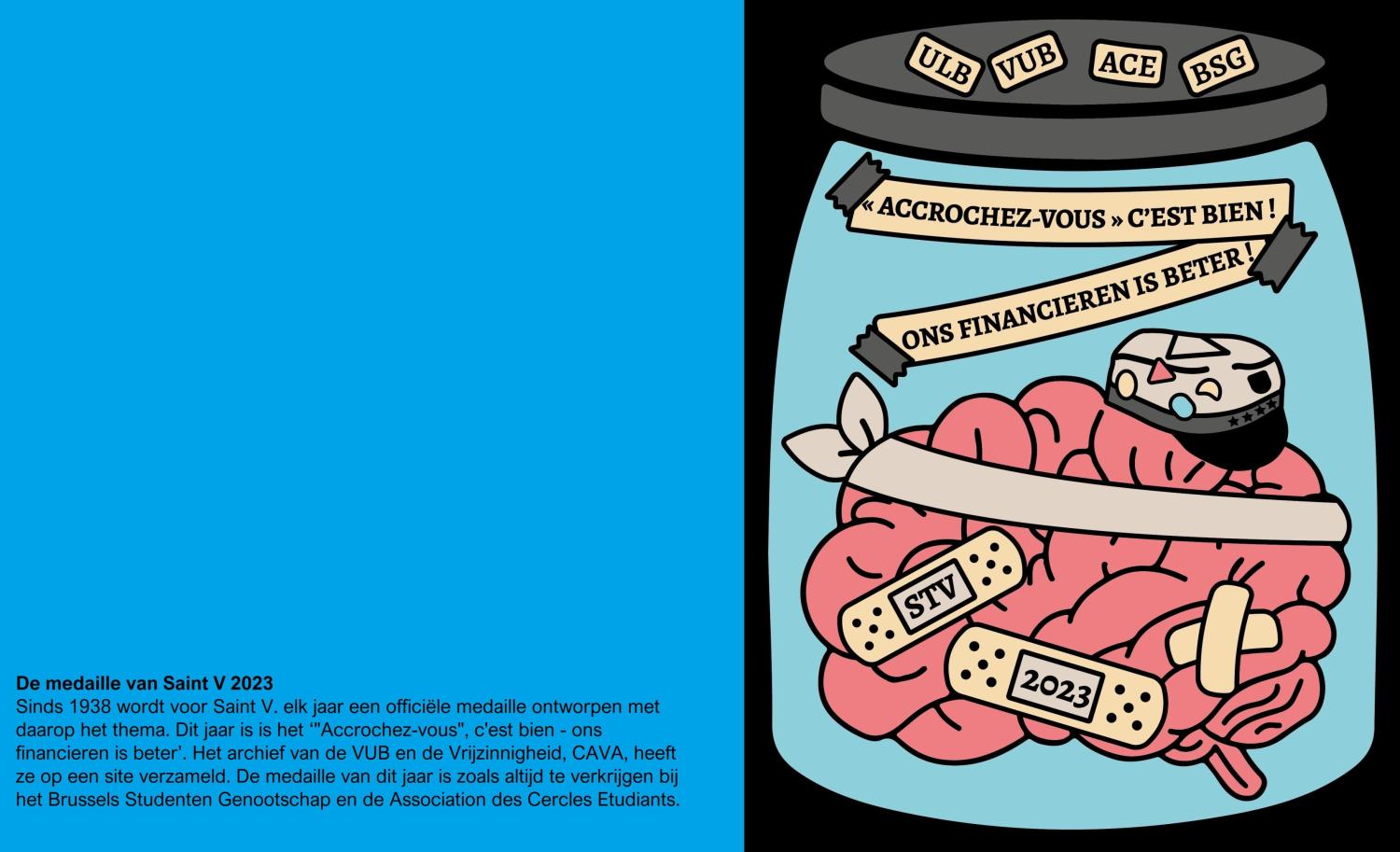
Psychology student Pili Verbinnen is president of the BSG, the umbrella association for students at VUB. Alongside the Association des Cercles Etudiants at sister university ULB, the BSG organises the annual Saint V celebration, which takes place on 20 November. This year’s theme is student mental health, with the slogan “‘Hang in there’, that’s fine – funding us is better”. Pili Verbinnen: “Instead of providing solutions, the government is kicking the problem down the road.”
This year’s Saint V medallion shows an illustration of a brain in a jar. What does that represent?
That’s the theme of Saint V. Students’ mental health is increasingly vulnerable, but instead of providing solutions, the government is kicking the problem down the road. You can keep certain things in a jar of water for a long time, but that doesn’t mean they’ll smell good when you take them out.
How do students prepare for Saint V?
For most people in the student circles, baptism is behind them. Now we have a quieter time where there’s a lot of bonding within the circle and any frustrations from the baptism period can be addressed. That way, everyone can enjoy Saint V, a traditional festival where we celebrate liberalism and free inquiry.
What’s the message of your Saint V speech?
The speech I’m giving with my ULB counterpart, the president of the ACE, is about how we need to go back to our roots. Saint V didn’t start as a celebration but as a protest against the then undemocratic rule of the Université Libre de Bruxelles. Today, there are many things in our world that aren’t in line with our values and norms. So it’s important that we remember our roots and continue to stand up for the world in which we want to send our students after they graduate.

Théodore Verhaegen mainly fought against Catholic traditions and dogmas. Which dogmas and beliefs are you fighting against now?
I am convinced that everything goes in cycles, and so do progress and opposition, the things we are fighting for or against. By this I mean that although over the past 30 years there has been a lot of progress in terms of the rights of the LGBTQIA+ community, now there is more and more opposition. So I’m convinced there will never be an issue that it’s no longer relevant to stand up for. The priority you set in doing so is the only thing that changes.
Is Saint V still against the bourgeoisie, as it used to be?
I think the theme of student mental health addresses that even more than in previous years. As a student, you have to succeed or you get the message that university isn’t for everyone. It’s a message confirmed by Françoise Bertieaux, the minister of Higher Education. What you achieve with this is that students drop out and therefore cost the state less. The students who drop out tend to be those who have to work while studying, support their families or make time to cope with traumas, or those who weren’t brought up with the same study ethic. As a result, universities are once again only a place for the upper classes.
What’s the most fun part of Saint V? At the end of the day, isn’t it all about having fun?
To my mind, the best thing about Saint V is the intergenerational aspect. The newest batch of students standing around playing games in their white lab coats, the latest graduates looking on proudly, chatting with their predecessors, and the surprised looks from interested students when they meet someone – very old in their eyes – who can tell them so much about folklore. That, for me, is Saint V.
The birth of Saint V
Every year on 20 November, the Université Libre de Bruxelles (ULB) and the Vrije Universiteit Brussel (VUB) honour their founder, Pierre-Théodore Verhaegen, during Saint V. This festive event is organised by the universities’ student associations, the Brussels StudentenGenootschap and the Association des Cercles Etudiants, and attracts hundreds of people from both universities. An eclectic group of students, alumni, researchers and professors gather at the Zavel in Brussels and head to the Beurs. For the public, the most striking aspect of Saint V is the colourful parade, which always focuses on a political or social theme.
The festivities start in the morning, however, with a solemn ceremony in which the administration and associations pay tribute not only to Verhaegen but also to other important humanist figures. They do this with floral tributes and speeches, in memory of resistance fighters from the Brussels university and students who gave their lives during the world wars.
The origins of this celebration date back to 1888, when students called for university authorities to be more open and less dogmatic. They appealed to the anticlerical and enlightened ideas of Verhaegen. To reinforce their plea, they laid flowers on his grave. Their gesture was mocked in the press, with the newspaper Le Patriote ridiculing the students by declaring Verhaegen a saint. The students embraced this mockery and dubbed their hero “Saint Verhaegen”.
In 2019, Saint V celebrations were included in the list of Brussels’ cultural intangible heritage, officially recognising the event’s historical significance and tradition. It remains a vivid reminder of the unifying values of academic freedom and humanism that both universities cherish and celebrate annually.
CAVA’s archive of medals can be found here.
hief van CAVA vindt u hier.